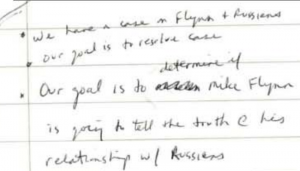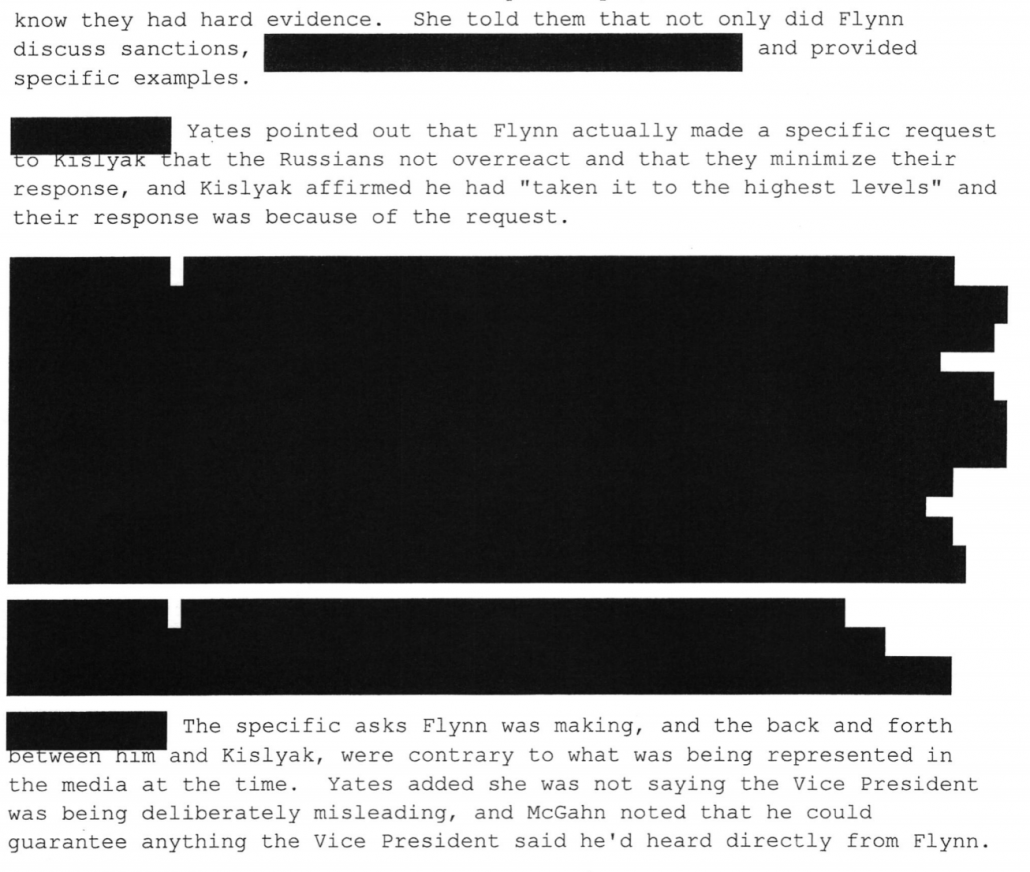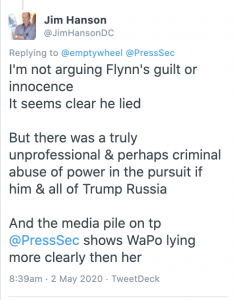Bill Barr Not Only Overrode Emmet Sullivan’s Brady Ruling, He Explicitly Pre-Empted Sullivan’s Covington Review
In a post last Monday, I laid out four different ways that Billy Barr was pursuing to guarantee that Mike Flynn would be excused for calling up the country that had just attacked us in 2016 and asking them not to worry about the sanctions imposed as a result. In it, I described how, in the wake of Emmet Sullivan’s decision that a bunch of files Flynn had demanded neither counted as Brady material nor merited dismissal, Barr had asked St. Louis US Attorney Jeffrey Jensen to review the files at issue in Sullivan’s ruling.
Approximately the week before Flynn filed his motion to dismiss, Barr appointed the St. Louis US Attorney, Jeffrey Jensen, to review Flynn’s prosecution.
It’s hard to overstate how abusive this was, on Barr’s part. When Barr did this, Judge Sullivan had already ruled there was no reason to dismiss the prosecution, and ruled that the items now being produced were not discoverable under Brady. What the review has done, thus far, has been to provide Flynn with documents that someone — presumably Derek Harvey — had reviewed, so he can obtain stuff even Judge Sullivan ruled he was never entitled to receive.
Moreover, Barr did this even though he had already appointed John Durham to review what has come to incorporate Flynn’s prosecution under a criminal standard. Durham could obtain all this evidence himself as part of his investigation, but he can only do something with it if it is evidence of a crime. Effectively, Barr has asked two different prosecutors to review this prosecution, the latter effort of which came after a judge had already ruled against it.
That said, given the prospect that litigation over Covington’s supposed incompetence may be highly damning to Flynn’s reputation, the Jensen review provides Barr with another option. He can use it as an excuse to order prosecutors to withdraw their opposition to Flynn’s motion to dismiss. It’s unclear whether Jensen has found anything to merit that yet, and Jensen appears to be engaging in analysis that might undercut where Barr wants to go with this (though given how closely Deputy Attorney General Jeffrey Rosen’s office is involved in this, I doubt that will happen). That said, Barr’s treatment of the Mueller Report proves that he has no compunction about claiming that a prosecutor’s conclusions say one thing when in fact they say something very different. And so at any moment, Barr may order prosecutors to effectively wipe away the prosecution of General Flynn.
In it, I underestimated Barr’s brazenness. He went further than ordering prosecutors to withdraw their opposition to Flynn’s motion to dismiss. He affirmatively moved to withdraw the case, with prejudice. Notably (given Barr’s past misrepresentation of what prosecutors have said), DOJ did not include anything in writing from Jensen’s review. While Jensen has issued a short statement in support of the dismissal, neither the public nor Sullivan have seen the so-called analysis Jensen purportedly did in this review.
Still, I was totally correct that “at any moment” Barr might order prosecutors to “effectively wipe away the prosecutor of General Flynn.”
The post laid out some key issues of timing, however. Of particular note, on Friday, prosecutors would have submitted a filing explaining what they planned to do with the 600 pages they had received from Covington & Burling elaborating on documents already public that show Flynn didn’t fully disclose things he later admitted to under oath. Given what was already public — which showed that even Flynn’s sworn declaration in his motion to dismiss did not accurately present Covington’s representation — those documents, if made public, would likely be very damning to Flynn.
But since Flynn filed this motion, Covington has turned over 500 additional pages of evidence to prove their competence, as well as 100 pages of sworn declarations. Sidney Powell has made aggressive claims that damage Covington’s reputation, they appear to have gotten paid nothing for representing Flynn, and Judge Emmet Sullivan showed some interest in putting everyone under oath to fight this out. So it’s possible that this will lead to a spectacular hearing where very reputable Republican lawyers will have an opportunity to disclose how much Flynn lied to them.
[snip]
On May 8, the government will provide a status update or proposed briefing schedule on Motion to Withdraw. Most likely, this will be an anodyne filing. But it’s possible we’ll get a summary of what Covington included in the 600 pages they turned over, which may be very damaging to Flynn’s case.
That is, a week ago, I noted that Flynn’s efforts to blow up his prosecution might soon backfire.
I also noted that Barr had two parallel efforts to undo the prosecution of Mike Flynn: Jensen’s, and John Durham’s. John Durham has been reviewing the first six months of the Russian investigation for a year already. He has had access to this information for that entire time. But even on top of the Durham review, Barr appointed Jensen.
In his interview the other day, Barr bragged about why he had done so. He had to “move quickly,” the Attorney General admitted, because of the motions that were filed in this case.
I made clear during my confirmation hearing that I was gonna look into what happened in 2016 and ’17. I made that crystal clear. I was very concerned about what happened. I was gonna get to the bottom of it. And that included the treatment of General Flynn.
And that is part of John Durham, U.S. Attorney John Durham’s portfolio. The reason we had to take this action now and why U.S. Attorney Jeff Jensen came in was because it was prompted by the motions that were filed in that case. And so we had to sorta move more quickly on it. But John Durham is still looking at all of this.
Except Barr didn’t allow those pleadings to play out.
Indeed, Barr acted on Thursday to prevent the ethical consequence of Flynn’s motion to dismiss based off a claim Covington was incompetent to occur, the public disclosure of those filings showing Covington’s representation of Flynn.
Billy Barr took a breathtaking step on Thursday to pre-empt Sullivan’s review of whether Covington really provided Flynn incompetent representation, or instead advised him wisely to dodge the accountability of his secret work for a frenemy government.
As such, DOJ has overridden the authority of an Article III judge at least twice: Sullivan’s previous ruling on Brady, and his upcoming review of Flynn’s claim that his lawyers were incompetent.
Barr said he was tasking Jensen to do more.
Well, you know, I don’t wanna, you know, we’re in the middle of looking at all of this. John Durham’s investigation, and U.S. Attorney Jensen, I’m gonna ask him to do some more work on different items as well.
Given Barr’s unbridled efforts to excuse Flynn’s actions secretly working with foreign governments to undermine the stated policy of the United States, I suspect he may ask Jensen to invent some excuse to back out of the government appeal in Flynn’s partner, Bijan Kian’s case.
Update: I also predicted the tie between the dangers of the motion to withdraw and the Jensen review in February, when it became public.
Back in June, it seems clear, Bill Barr told Sidney Powell it would be safe to blow up Mike Flynn’s plea deal, perhaps believing that things he saw on Fox News — including a bunch of hoaxes that Sara Carter had started, and which FBI had already investigated multiple times. Powell proceeded to make Flynn’s legal woes worse and worse and worse. Alarmingly, she had Mike Flynn submit a sworn statement that radically conflicts with other sworn statements he already made. In other words, based on Bill Barr apparent reassurances that Flynn should pursue an absolutely insane legal strategy, Flynn turned his probation sentence into additional perjury exposure.
And so now Bill Barr is sending off his minions to try to undo the damage that Flynn and Powell created for themselves by trying to suggest that multiple lies to the FBI somehow amounted to an ambush because Flynn was so sure the FBI was on his side that he lied convincingly.
In the wake of Bill Barr’s intervention last week, Flynn moved to withdraw all his pending motions, without prejudice, including the motion to withdraw his guilty pleas. Given that, as part of that motion, Flynn submitted a sworn filing that materially conflicts with other sworn statements Flynn has made before this and Judge Contreras’ court, as well as before a grand jury, and given that Barr went out and admitted on TV that those filings were the reason he acted in such an unprecedented fashion to pre-empt an Article III judge’s decision, it seems that Barr’s actions actually don’t affect that motion to withdraw. Sullivan could reject that, since parts of it are unaffected by Barr’s actions.
Unlike Barr, Judge Sullivan is not predictable. So I’m not predicting that will happen. But among the many pending requests before Sullivan is a request to unring yet another Flynn statement that might be a material lie, one he does not have to accept.









